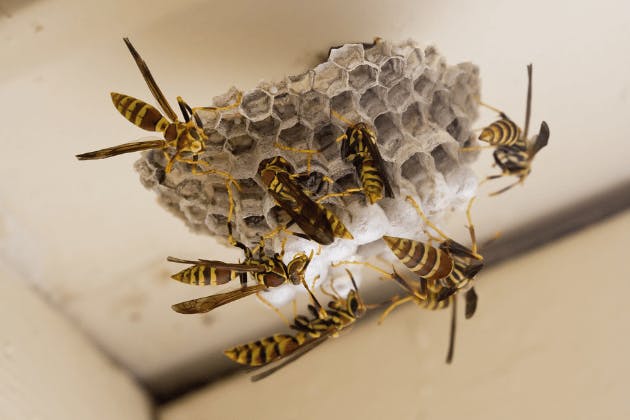In this comprehensive guide, we'll dissect ten common wasp myths, examining the truth behind wasp behaviour, their role in pest control, and their importance to our gardens and environment. By separating fact from fiction, we aim to provide you with a clearer understanding of these often-feared insects.

Myth 1: Wasps are Aggressive and Will Sting You for No Reason
Contrary to popular belief, wasps are not inherently aggressive creatures. They don't seek out humans to sting for sport or malice. In fact, wasps typically only become defensive when they perceive a threat to themselves or their nest. This misconception often stems from encounters where humans unwittingly provoke wasps by swatting at them or approaching their nests.
Wasps are most likely to sting when:
- Defending their nest
- Feeling trapped or cornered
- Accidentally crushed (e.g., when stepping on them barefoot)
To avoid wasp stings:
- Remain calm if you encounter wasps
- Move slowly and steadily away from nests
- Avoid wearing bright colours or floral patterns, which can attract wasps
- Keep food and sugary drinks covered when outdoors
Myth 2: All Wasps are Dangerous and Should be Exterminated
This myth is not only false but potentially harmful to ecosystems. Wasps play crucial roles in the environment, and a blanket approach to extermination could have severe consequences. Most wasp species are not aggressive towards humans and provide significant benefits:
- Pest control: Wasps prey on various insects that damage crops and gardens.
- Pollination: While not as efficient as bees, wasps do contribute to pollination.
- Ecosystem balance: Wasps are part of the food chain, serving as prey for birds and other animals.
Attempting to swat or kill wasps often leads to the release of pheromones that attract more wasps, potentially escalating the situation. It's far more effective to prevent wasp problems through proper food storage and waste management.
Myth 3: Wasps are Just Annoying Pests with No Purpose
This myth couldn't be further from the truth. Wasps serve several vital purposes in our ecosystems:
- Natural pest control: Predatory wasps feed on insects that we consider pests, including caterpillars, flies, and aphids. This natural form of pest control reduces the need for chemical pesticides in agriculture and gardens.
- Pollination: While not as specialised as bees, wasps do contribute to pollination. Some plants, like figs, rely entirely on specific wasp species for pollination.
- Ecological balance: Wasps are part of complex food webs. They serve as prey for birds, bats, and other insectivores, contributing to biodiversity.
- Decomposition: Some wasp species aid in the breakdown of organic matter, contributing to nutrient cycling in ecosystems.
Myth 4: Wasps are Just Like Bees
While wasps and bees are both members of the order Hymenoptera, they have distinct differences:
- Behaviour: Wasps tend to be more aggressive when threatened, while bees are generally passive unless directly provoked.
- Appearance: Wasps typically have smoother, more streamlined bodies compared to the fuzzy appearance of bees.
- Diet: Adult wasps are primarily carnivorous, feeding on other insects. Bees, on the other hand, feed on nectar and pollen.
- Pollination: Bees are specialised pollinators with pollen baskets on their legs. Wasps pollinate incidentally as they move between flowers.
- Stinging: Bees can only sting once, losing their stinger in the process. Wasps can sting multiple times.
- Social structure: While both have social species, the complexity and organisation of their colonies differ significantly.
Myth 5: You Can Remove a Wasp Nest on Your Own
Attempting to remove a wasp nest without professional help is highly risky and not recommended. The dangers include:
- Multiple stings: Disturbing a nest can provoke a swarm of defensive wasps.
- Allergic reactions: Some individuals may have severe allergic reactions to wasp stings.
- Incomplete removal: Amateur attempts often fail to completely remove the nest, leading to recurring problems.
- Property damage: Improper removal techniques can damage buildings or landscaping.
Always contact a professional pest control service for safe and effective wasp nest removal. They have the proper equipment, protective gear, and expertise to handle the situation safely.
Myth 6: Wasps Only Feed on Insects
While it's true that adult wasps primarily feed on other insects, their diet is more diverse than many people realise:
- Sugary substances: Wasps are attracted to sweet foods, including overripe fruit, fizzy drinks, and human food.
- Carbohydrates: They seek out carbohydrates, especially in late summer when their preferred protein sources become scarcer.
- Nectar: Some wasp species feed on nectar from flowers, contributing to pollination.
This diverse diet explains why wasps are often attracted to outdoor meals and rubbish bins. It's important to note that wasps feeding on fermented sugars can become more aggressive due to the effects of alcohol.
Myth 7: Wasps are Always Irritable
Wasp behaviour and temperament can vary significantly based on several factors:
- Season: Wasps tend to become more aggressive in late summer as their food sources change and colony dynamics shift.
- Temperature: Extreme heat can make wasps more irritable and likely to sting.
- Overcrowding: Large colonies can lead to increased aggression due to competition for resources.
- Diet: Changes in diet, particularly increased sugar consumption, can affect wasp behaviour.
Understanding these factors can help predict and manage wasp behaviour more effectively.
Myth 8: Wasps Do Not Produce Honey
While it's true that most wasp species don't produce honey, there are exceptions:
- Mexican Honey Wasp: This species produces and stores honey, albeit in smaller quantities than honey bees.
- Brachygastra mellifica: Another honey-producing wasp species found in Central and South America.
It's worth noting that honey production is rare among wasps, with only a few species exhibiting this behaviour. In contrast, only about 5% of bee species produce honey, despite the common association between bees and honey production.
Myth 9: Wasps are Not Important for the Garden
Wasps play a crucial role in maintaining garden health:
- Pest control: Wasps prey on common garden pests like caterpillars, aphids, and flies, reducing the need for chemical pesticides.
- Pollination: While not as efficient as bees, wasps do contribute to pollination of garden plants.
- Soil aeration: Some ground-nesting wasps help aerate the soil through their burrowing activities.
- Biodiversity: Wasps contribute to overall garden biodiversity, supporting a healthy ecosystem.
Gardeners can benefit from encouraging beneficial wasp species while managing potentially problematic nests near high-traffic areas.
Myth 10: Most Wasps Can Sting
Contrary to popular belief, only a small percentage of wasp species (about 3%) are capable of stinging. The vast majority of wasps are stingless and pose no threat to humans. This misconception likely arises from the fact that the most commonly encountered wasp species, such as yellowjackets and hornets, are among those capable of stinging.
Understanding this fact can help reduce unnecessary fear and promote a more balanced view of wasps and their role in our ecosystems.
FAQs
Contact us for wasp nest removal in Hampshire
For local and reliable wasp nest removal services in Portsmouth, Fareham, Gosport & Petersfield, get in touch with us here!


